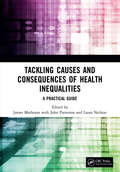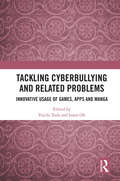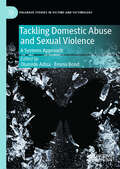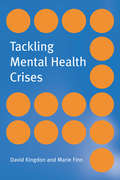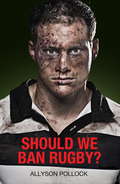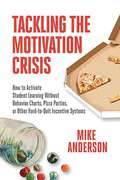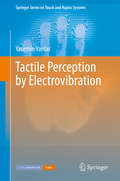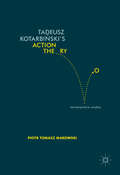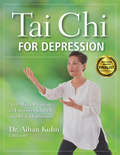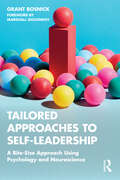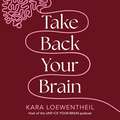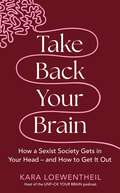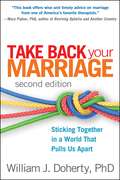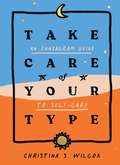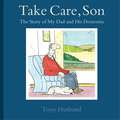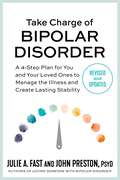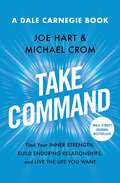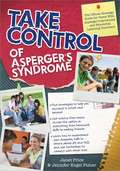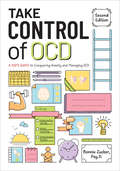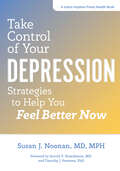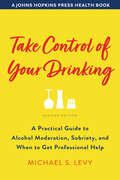- Table View
- List View
Tackling Causes and Consequences of Health Inequalities: A Practical Guide
by James Matheson John Patterson Laura NeilsonAddressing health inequalities is a key focus for health and social care organizations, yet this is the first book to explore how best frontline health workers in areas of deprivation can address these problems. Aimed at doctors and their wider multidisciplinary teams, this book provides key knowledge and practical advice on how to address the causes and consequences of health inequalities to achieve better outcomes for patients. Considering the psychological, financial and social aspects of well-being as well as health concerns, this book offers a concise but comprehensive overview of the key issues in health inequalities and, most importantly, how practically to address them. Key Features Comprehensively covers the breadth of subjects identified by RCGP’s work to formulate a curriculum for health inequalities The first book to address the urgent area of causes and consequences of health inequalities in clinical practice. Chapters are authored by expert practitioners with proven experience in each aspect of health care. Applied, practical focus, demonstrating approaches that will work and can be applied in ‘every’ situation of inequality. Provides evidence of how community based primary care can make a change.
Tackling Cyberbullying and Related Problems: Innovative Usage of Games, Apps and Manga
by Toda, Yuichi / Oh, InsooThis book looks at innovative tools developed by Japanese and Korean researchers and practitioners to tackle cyberbullying and internet-related problems (addiction, cybercrimes, etc.). The contributors have created preventative and intervention measures for children using games, apps, manga and anime videos, which are more accessible for children than textbooks or classroom-based lessons. The contributors cover their experiences of developing these new approaches with children, parents and teachers as well as giving insights and evidence into how these innovative techniques and methods work. By sharing their expertise, the authors hope to contribute to further improvements of games, apps, manga and anime and to improve the safety of children online.
Tackling Domestic Abuse and Sexual Violence: A Systems Approach (Palgrave Studies in Victims and Victimology)
by Emma Bond Olumide AdisaThis edited book brings together a range of expert voices – academics, researchers, practitioners, activists, and policy leads – who are responding to domestic and sexual violence (DASV) in various settings. The chapters are united in the need to embed systemic responses to these social issues within a broader accountability and support system. It provides a timely and refreshing take on tackling a pervasive social issue at a time of increased complexity and crisis while exploring the real-world consequences and impacts of service provision at a systems level, emphasising the need for greater coordination and alignment.
Tackling Mental Health Crises
by David Kingdon Marie FinnTackling Mental Health Crises provides a practical guide to combining social and psychological responses to mental health problems. David Kingdon and Marie Finn look at what constitutes a crisis, be it an individual crisis presentation or a situational crisis for services. They reject current diagnostic approaches to mental health, focussing instead on a symptom-led approach and keeping an awareness of the intervention experience for clients and carers throughout. Subjects covered include: engaging and assessing the client risk assessment and management emotional, behavioural, cognitive and physical presentations service teams and settings. The emphasis throughout is on taking a holistic look at crisis prevention and management, encompassing both the work that takes place at an individual level and the wider impact of societal and political issues. Containing clear direction and practical advice, combined with numerous case studies and commentary from users and carers themselves, this book will be of great use to anyone involved with dealing with mental health crises.
Tackling Precarious Work: Toward Sustainable Livelihoods (SIOP Organizational Frontiers Series)
by Stuart C. Carr Veronica Hopner Darrin J. Hodgetts Megan YoungTackling precarious work has been described by the United Nations (UN)’s International Labour Organization (ILO) as the main challenge facing the world of work. In this ground-breaking book, leading applied research scholars, advocates, and activists from across the globe respond to this challenge by showing how Industrial and Organizational (I/O) psychology has a significant contribution to make in humanity moving away from precarious work situations towards sustainable livelihoods. Broken down into four key parts on Sustainable Livelihoods, Fair Incomes, Work Security and Social Protection, the book covers a multitude of topics including the role of poor pay, lack of work-related security, social protection for human health and wellbeing, and interventions and policies to implement for the future of work. The volume offers a detailed look into useful and effective ways to tackle precarious work to create and maintain sustainable livelihoods. This curated collection of 22 chapters considers the broader relationships between previous research work and issues of human security and sustainability that affect workers, families, communities, and societies. Each chapter expands the present understandings of the world of precarious work and how it fits within broader issues of economic, ecological, and social sustainability. In addition to I/O psychologists in research, practice, service and study, this book will also be useful for organizational researchers, labor unions, HR practitioners, fair trade, cooperative, and civil society organizations, social scientists, human security analysts, public health professionals, economists, and supporters of the UN SDGs, including at the UN.
Tackling Rugby
by Allyson PollockOn 29 January 2011, Benjamin Robinson was playing rugby for his school. During the match he sustained a concussion but was not taken off, and was allowed to continue with the game, in which he endured a second impact. When play ended, he collapsed, dying two days later as a result of his injuries. Every week young children are hospitalized on the playing fields of Britain. Yet the subject is rarely investigated, injury data are not systematically collected, and as a result any real attempt to work out how to make youth rugby safer is flawed. Using meticulous, peer-reviewed research, leading public health specialist Allyson M. Pollock sets out the true risks associated with the sport, raising uncomfortable questions for politicians and the educational authorities.From the Trade Paperback edition.
Tackling Sexual Violence at Universities: An International Perspective (New Frontiers in Forensic Psychology)
by Graham J. Towl Tammi WalkerSexual violence is a problem well beyond universities, however universities are uniquely well placed to contribute to reducing sexual violence, encouraging those affected to come forward and speak about their experiences and actively encourage increased reporting. This book is unique, in that it offers an international perspective on the incidence, reporting and impact of sexual violence at universities. Drawing on evidence from the UK, North America, Australia and Europe, Towl and Walker explore the psychological and structural challenges to reporting sexual violence. They provide a set of policy and practice guidance recommendations that move beyond awareness campaigns to call for systems to be put in place whereby reports of sexual assault are handled promptly, fairly and consistently. They also discuss how universities can strengthen their approach to prevention, promoting safeguarding and the welfare of victims and survivors, and involving victims and survivors in the development and improvement of services. However, fundamental to their approach is keeping decision making with the victim and survivor, and emphasising that their health and recovery is paramount. Tackling Sexual Violence at Universities is an invaluable and ground-breaking resource for students and researchers in forensic psychology and criminology, as well as professionals working in higher education. The authors are donating their royalties in full to Kirklees and Calderdale Rape & Sexual Abuse Centre (KCRASACC), UK, a small registered charity that provides specialist therapy, counselling advocacy and support for survivors of sexual or domestic violence and abuse. Running for nearly 30 years, the centre works with young people and adults over the age of 13.
Tackling the Motivation Crisis: How to Activate Student Learning Without Behavior Charts, Pizza Parties, or Other Hard-to-Quit Incentive Systems
by Mike AndersonTeachers use traditional incentive and reward systems with the best of intentions. We're trying to support students' positive behavior and learning. We're hoping to motivate and inspire students to work hard and do well in school. If everyone behaves, we'll have a pizza party. The more books you read, the more stickers you'll receive. On the surface, these systems seem to make sense. They may even seem to work. But in the long term, they do not foster intrinsic motivation or a love of learning. In fact, they often have the opposite effect.
Tactile Perception by Electrovibration (Springer Series on Touch and Haptic Systems)
by Yasemin VardarThis book explains the mechanisms underpinning the tactile perception of electrovibration and lays the groundwork for delivering realistic haptic feedback on touchscreens via this method. Effective utilization of electrovibration can only be accomplished by simultaneously investigating both the physical and perceptual aspects of the finger-touchscreen interaction. Towards this goal, present work blends the available knowledge on electromechanical properties of the human finger and human tactile perception with the results of new psychophysical experiments and physical measurements. By following such an approach that combines both theoretical and experimental information, the study proposes new methods and insights on generating realistic haptic effects, such as textures and edges on these displays. Besides, state-of-the-art research on the field is reviewed, and future work is discussed. The presented interdisciplinary methods and insights can interest students, broad communities of haptics, neuroscience, engineering, physics, and cognitive sciences, as well as user-interaction experts and product designers from the industry.
Tadeusz Kotarbiński’s Action Theory
by Piotr Tomasz MakowskiThe book introduces Tadeusz Kotarbiński's philosophy of action into the mainstream of contemporary action-theoretical debates. Piotr Makowski shows that Kotarbiński-Alfred Tarski's teacher and one of the most important philosophers of the renowned Lvov-Warsaw school--proposed a groundbreaking, original, and (in at least a few respects) still fresh perspective in action theorizing. The book examines and develops Kotarbiński's ideas in the context of the most recent discussions in the philosophy of action. The main idea behind Kotarbiński's action theory--and thus, behind this book--is the significance of the philosophical investigations of the general conditions of effectiveness, efficiency, and economy of intentional actions. Makowski presents and reinterprets Kotarbiński's views on these dimensions of our activities and sheds new light on the most important areas of action theory.
Tai Chi for Depression: A 10-Week Program to Empower Yourself and Beat Depression
by Aihan KuhnThis book is designed to help readers understand depression and make positive changes to overcome it. Dr. Aihan Kuhn teaches a unique tai chi form that combines elements of Chen and Yang styles as well as qigong and meditation. The form is easy to learn, easy to remember, and easy to practice. Dr. Kuhn’s multidisciplinary approach to mental health also focuses on positive thought, a healthy diet, and self-confidence. Dr. Kuhn instructs readers on a unique tai chi form that is perfect for beginners and experienced practitioners alike. The circular movements create better energy flow in the body. The martial character empowers the mind, strengthens the body, improves stamina, and increases self-esteem. Slow, symmetrical movements promote balance and calm. This book features: • Detailed instructions and photos describing Dr. Kuhn’s 16-step tai chi form • Personal reflections on using tai chi to overcome depression • A 10-week plan to help readers begin their journey to wellness With this book you will: • Learn about the clinical features of depression • Learn Dr. Kuhn’s 16-step tai chi form • Discover the psychological, emotional, and spiritual benefits of tai chi • Begin a holistic approach to mental health “When I was just starting out as a doctor, my focus was mainly on treating disease,” Dr. Kuhn writes. “Now my focus is on teaching people how to prevent disease and treating patients in the early stages of their illness so they can avoid additional problems.” In many ways, Tai Chi for Depression represents the culmination of her life’s work.
Tailored Approaches to Self-Leadership: A Bite-Size Approach Using Psychology and Neuroscience
by Grant BosnickThis book provides a uniquely adaptable approach to develop awareness (of self, others and one’s environment) of self-leadership through real behavioral change. Through neuroscience, psychology and behavioral science approaches, each chapter will help readers make their learning and development personal and take it to a deeper level. With a tip of the hat to the gamebook format where you choose your adventure, readers are encouraged to take an original online self-assessment quiz to determine the challenges and priorities they are presently facing. The quiz then provides a suggested reading order of chapters to address these growth areas. Each of the 18 chapters explores a different theme related to self-leadership and are written in such a way that one can read them in any order. Filled with practical activities, reflective questions and personal anecdotes, Bosnick encourages readers to understand behavior from the "inside-out" of neuroscience and how the brain works, while also keeping an eye on the "outside-in:" how we understand others and how others see us. Combining research-backed principles with tried-and-tested exercises, this is a book tailored for leaders of all levels, professionals in a transitory phase of their career, as well as those just starting out in the working world.
Tailoring Treatment to Attachment Patterns: Healing Trauma in Relationship
by Karen Pando-Mars Diana FoshaHarnessing the power of attachment to transform psychotherapy. Research shows that attachment patterns—our patterns of relating to others, which develop in early childhood—affect far more aspects of our lives than was previously thought. Given how crucial these patterns are to how every patient relates to the world and to their own selves, how can therapists harness attachment to provide more effective therapy? Using AEDP® psychotherapy theory and methodology as a foundation, the authors present an innovative approach that tailors treatment to attachment patterns, allowing psychotherapists to help patients heal relational trauma. Here, readers will find attachment pattern-specific clinical interventions to help them translate attachment theory into transformative clinical practice. Case examples are used throughout to illustrate how to handle the unique challenges that psychotherapists encounter with each attachment pattern, while engaging commentary discusses how the attachment-informed experiential/relational process leads to healing attachment trauma and facilitating security, resilience, and well-being.
Take Back Your Brain: How a Sexist Society Gets in Your Head – and How to Get It Out
by Kara LoewentheilI never look good in skirts. I can't ask for a raise or my boss will think I'm greedy. I'm getting too old to find a partner. I'm a bad mom and my kids can tell. I'll never be good enough.Women absorb a lifetime of sexist social messaging that says our worth is determined by our looks, accomplishments, and what everyone (but ourselves) thinks of us. Take Back Your Brain exposes how the patriarchy hijacks our minds and wrecks our confidence-and shows how to break free once and for all.For a long time, Kara Loewentheil wasn't sure why she, like so many ambitious women, still wrestled with insecurity and low self-esteem, despite two Ivy League degrees, a successful law career, and a thriving social life. After breaking down under her desk one day, she decided enough was enough. Kara learned the power of thought work, became a Master Certified Life Coach, rewired her brain to overcome sexist social messages, and began to coach other women to do the same.Now in Take Back Your Brain, she shows you how to undo the socialisation you never asked for, starting with reprogramming your core beliefs from patriarchy's corrosive influence. Weaving cognitive psychology and feminist theory with practical thought work exercises, this book teaches you to:· Identify the conscious and unconscious biases that infiltrate your self-talk· Replace self-critical thoughts with new· Self-affirming beliefs· Embrace your emotions without fear of being seen as "too much"· Create new, empowered thought patterns around how you relate to your body, finances, and relationships· Stop relying on others for validation and start building self-confidence from withinBy changing your thoughts, you can transform your emotions, actions, the direction of your life, and ultimately the world. Because when women unleash their true power, they awaken new possibilities for all of us.
Take Back Your Brain: How a Sexist Society Gets in Your Head – and How to Get It Out
by Kara LoewentheilWhat if every time you had a self-critical thought, you heard it in a man's voice? The truth is not far off. Living in a patriarchy, women absorb a lifetime of messages that say your worth is defined by your looks, your accomplishments, and how well you take care of everyone around you. In fact, these messages are so pervasive that, even knowing they exist, they still manage to program themselves into our brains. The result is that women end up feeling anxious, guilty, and vaguely ashamed of themselves no matter how much they do for others or achieve for themselves. So how do we deprogram our thoughts from patriarchy's corrosive influence? And once we do, how can we create new, self-empowering beliefs? Master Certified Life Coach and host of the UnF*ck Your Brain podcast Kara Loewentheil knows how. Despite graduating from Harvard Law School and getting her dream job, Kara spent her twenties and thirties feeling insecure and anxious, until she learned how to change her thoughts. In Take Back Your Brain, she draws on cognitive psychology, feminist theory, and years of experience as a neuroplasticity-focused coach to break down how the patriarchy hijacks women's brains, and how women can get free. To bridge the gap between your inner voice and your true potential, she says, you must begin with your thoughts. By using the skills in this book to literally rewire your brain, you can create new thought patterns that will directly transform outcomes in your life. Ultimately, Take Back Your Brain invites you to replace the thoughts that no longer serve you and make room for a kind of confidence you never thought possible.
Take Back Your Marriage, Second Edition
by William J. DohertyAll couples walk to the altar dreaming of happily ever after, but many forces in our society work against healthy lifelong commitment. Renowned family therapist William J. Doherty has helped many thousands of readers understand how cracks can develop in even a rock-solid marriage--and what steps they can take to keep their love strong. Vivid stories illustrate ways to break free of common traps like confusing desires with needs, seeing your spouse as a consumer product to be traded in for a new model, or becoming overtime parents instead of full-time partners. Empathic and motivating, Dr. Doherty shows how to create doable relationship rituals that stand the test of time. The updated second edition incorporates Dr. Doherty's ongoing experience counseling couples in conflict, plus the latest information on marriage and health, how divorce affects kids, the pitfalls of social media, and more.
Take Care of Your Type: An Enneagram Guide to Self-Care
by Christina S. WilcoxDiscover the self-care tips specifically designed for your Enneagram type with this simple yet illuminating guide from popular Enneagram expert Christina S. Wilcox.Many of us have used the Enneagram of Personality to understand ourselves on a profoundly intimate level. But despite what our Enneagram type reveals, it&’s not always easy to know the best ways to take care of ourselves according to our unique personalities. In Take Care of Your Type, Enneagram expert and social media sensation Christina S. Wilcox uses her knowledge of the Enneagram to illuminate how each of the nine Enneagram types can practice better self-care. Answering questions ranging from &“What is the best morning routine for my type?&” to &“What boundaries are important to set based on my individual personality traits?&” this handy guide filled with beautiful color illustrations will help you recenter and reconnect with yourself amid the stress of daily life and will leave you feeling happier and healthier in mind, body, and spirit.
Take Care, Son: The Story of My Dad and his Dementia
by Tony HusbandHi Dad . . . can we have a chat about your dementia . . . Can you remember how it started?When Ron Husband started to forget things - dates, names, appointments . . . daft things, important things - it took a while to realise that this was 'a different form of forgetting'. But it was just the first sign of the illness that gradually took him away from the family he loved.This is the touching, illustrated story of Tony's father and how dementia slowly took him away from his family. The title is a reference to his last words to his son - on a day when Tony had spent the day in the care home with no sign of recognition. The book is framed as a chat between Tony and his dad, who fades away through the last few pages of the book."... rather wonderful cartoon strips ... chronicling his father's dementia with loving charm and wit." Stephen Fry, Twitter
Take Care, Son: The Story of My Dad and his Dementia
by Tony HusbandHi Dad . . . can we have a chat about your dementia . . . Can you remember how it started?When Ron Husband started to forget things - dates, names, appointments . . . daft things, important things - it took a while to realise that this was 'a different form of forgetting'. But it was just the first sign of the illness that gradually took him away from the family he loved.This is the touching, illustrated story of Tony's father and how dementia slowly took him away from his family. The title is a reference to his last words to his son - on a day when Tony had spent the day in the care home with no sign of recognition. The book is framed as a chat between Tony and his dad, who fades away through the last few pages of the book."... rather wonderful cartoon strips ... chronicling his father's dementia with loving charm and wit." Stephen Fry, Twitter
Take Charge of Bipolar Disorder: A 4-Step Plan for You and Your Loved Ones to Manage the Illness and Create Lasting Stability
by John Preston Julie A. FastRevised and updated, Take Charge of Bipolar Disorder is a groundbreaking, comprehensive program to help those with bipolar disorder—and those who care about them—gain permanent control over their lives. Most people diagnosed with bipolar disorder are sent home with the name of a doctor and multiple prescriptions. However, few people with bipolar disorder are able to find long-term stability with medications alone. Bipolar disorder researcher and expert Julie A. Fast, who was diagnosed with the illness at age thirty-one, and specialist John Preston, PsyD, offer the pioneering Take Charge program used around the world to help readers promote stability, reduce mood swings, increase work ability, decrease health care costs, and improve relationships. The book guides those with bipolar disorder and their loved ones toward a comprehensive personal treatment plan by incorporating: Medications and bipolar-safe supplements Lifestyle changes that help manage bipolar symptoms naturally Behavior modifications that reduce and prevent symptoms Guidelines on assembling an effective support team By helping readers gather powerful strategies, Take Charge of Bipolar Disorder delivers a dynamic program to treat this difficult but ultimately manageable illness.
Take Command: Find Your Inner Strength, Build Enduring Relationships, and Live the Life You Want (Dale Carnegie Books)
by Michael A. Crom Joe HartTake command of your future with this groundbreaking book from the experts who brought you How to Win Friends and Influence People.Take Command offers powerful tools and time-tested methods to help you live an intentional life by transforming how you approach your thoughts, emotions, relationships, and future. Filled with stories of everyday people and based on expert research and interviews with more than a hundred high-performing leaders, Take Command gives you the strategies you need to unlock your full potential and create the life you want. Written by Joe Hart (CEO) and Michael Crom (Board Member) of Dale Carnegie & Associates, Take Command is a modern manual for personal development that will help anyone, at any age. It is structured around questions geared to encourage self-reflection, such as: -How do we use the power of mindset to deal with stress and anxiety, gain perspective on negative emotions, and build resilience? -Once we understand our inner lives, how do we create enriching, rewarding, and enduring relationships? -How do we deal with difficult people and manage conflict? -After mastering our thoughts and relationships, how do we live courageously and intentionally to build a vision that will bring out the best in ourselves and other people? For more than one hundred years, the wisdom of Dale Carnegie&’s How to Win Friends and Influence People has provided people around the world with richer, more fulfilling relationships and a happier way of life. Now, Take Command combines decades of Dale Carnegie&’s award-winning training and timeless principles—ones that have transformed the personal and professional lives of millions—into a master text that tells you everything you need to know about the art of human relations.
Take Control of Asperger's Syndrome: The Official Strategy Guide for Teens with Asperger's Syndrome and Nonverbal Learning Disorder
by Jennifer Engel Fisher Janet PriceTake Control of Asperger's Syndrome: The Official Strategy Guide for Teens With Asperger's Syndrome and Nonverbal Learning Disorder is a unique handbook for kids and teens on living successful lives with these disorders by taking control of their strengths to overcome their weaknesses. Drawing on their experiences as parents and teachers of students with Asperger's syndrome (AS) and Nonverbal Learning Disorders (NLD), the authors provide tips on understanding the disorders, living with the symptoms, succeeding in school, completing homework, talking to others about strengths and needs, making friends and socializing, and using technology to connect with other kids and teens with these disorders. By interviewing dozens of kids and teens who live with AS and NLD, the authors include ideas, information, and advice for students, by students just like them. This handy guidebook is sure to help any child or teen with AS or NLD navigate life's challenges with successful outcomes.
Take Control of OCD: A Kid's Guide to Conquering Anxiety and Managing OCD (Take Control Ser. #0)
by Bonnie ZuckerTake Control of OCD: A Kid's Guide to Conquering Anxiety and Managing OCD is a must-have guide for kids and teens ages 10–16 with obsessive-compulsive disorder to help them take control and use their strengths to find success in school and in life. This fully updated second edition:Uses a cognitive-behavioral therapy and exposure/response prevention method to stress gradual exposure to obsessive thinking patterns.Provides a step-by-step ladder-based process to help readers conquer their fears and demolish their worries.Helps kids change their obsessive thoughts, tolerate uncertainty, and develop positive self-talk and stress management.Also helps kids advocate for their needs in school and build successful relaxation procedures.Includes workbook-style pages for readers to complete.From her extensive work with hundreds of young people with OCD, the author offers tons of advice, information, and ideas for kids and teens. Readers will find themselves in this book, as it normalizes and validates the often hidden and undisclosed thoughts, urges, and images, and accompanying rituals and compulsions that so many children and teens with OCD struggle with.
Take Control of Your Depression: Strategies to Help You Feel Better Now (A Johns Hopkins Press Health Book)
by Susan J. NoonanPractical, day-to-day ways to manage your depression.Some call it the blues or a storm in their head. William Styron referred to it as "darkness visible." Whatever the description, depression is a disorder of the mind and body that affects millions of adults at some point in their lives. In Take Control of Your Depression, Dr. Susan J. Noonan provides people experiencing depression with strategies to take stock of their mental state, to chart a course toward emotional balance, and to track their progress on the journey to well-being. Writing from her personal experience as both a recipient and a provider of mental health services, Dr. Noonan explains how to obtain care from professionals, outlines what medical options are available, and lists everyday things people can do to feel better. Integrating medicine, psychology, and holistic care while exploring the basics of mental health, she touches on diet, sleep habits, physical activity, and mindfulness techniques.This useful and compassionate workbook, which is specifically designed for people who find it difficult to focus and concentrate during a depressive episode, includes• proven relapse prevention and resilience techniques• targeted cognitive exercises • daily worksheets that can be used to track your progress and response to therapy• the fundamentals of Cognitive Behavior Therapy• advice on dealing with family and friends• guidance from remarkable people on depression• a discussion of how technology and social media can be used to manage well-being• a section on treatment-resistant depression• specialized tips aimed at women, men, adolescents, the elderly, and people dealing with chronic illnessThe only workbook on depression that combines a discussion of medical options, talk therapy techniques, and established self-help strategies, Take Control of Your Depression empowers individuals to participate in their own care, which offers them a better chance of recovery and of staying well.Praise for Other Books by Susan J. Noonan"This practical and compassionate handbook is perfectly suited to individuals living with depression: in accessible language, it offers firm, specific advice and quick cognitive tests and self-assessment metrics that even those in the deepest of doldrums will find helpful and relevant... a valuable volume for those suffering from depression, as well as for loved ones who are fighting the fight by their side."—Publisher's Weekly"From defining a baseline of depression to charting moods and preventing relapses, this workbook is a top pick for any depression sufferer!"—Reference and Research Book News"This practical guide is an important contribution to the growing genre of self-help works on this topic."—Library Journal"This text is a much-needed addition to mental health literature, as depression is stigmatized and few understand how to support friends and loved ones who frequently do not obtain help on their own."—American Reference Books Annual"This book offers useful insight for any health professional working within mental health... It is of enormous value to the layperson, hungry for knowledge about how best to interact and help their loved one face the dreadful ravages of depression."—Nursing Times
Take Control of Your Drinking: A Practical Guide to Alcohol Moderation, Sobriety, and When to Get Professional Help (A Johns Hopkins Press Health Book)
by Michael S. LevyAccepting that there is no one-size-fits-all approach to controlling drinking, the latest edition of this bestselling book will help you assess your drinking and determine whether moderation or abstinence is the best path for you.For decades, the standard treatment for people struggling with alcohol consumption has focused on convincing them to admit that they are an alcoholic, to stop drinking entirely, and to enter into a program, most commonly Alcoholics Anonymous. But in his more than thirty-five-year career as an addiction specialist working with people who want to change their drinking habits, Michael S. Levy has found that the routes to behavioral change actually vary. And although abstinence is the successful route for many people, others can moderate their drinking on their own or with professional help. In this practical, effective, and compassionate book, Levy helps people take control of their alcohol problem by teaching them how to think about and address their drinking habits. Beginning with a set of self-assessments that reveal whether the reader's use of alcohol is creating problems, Levy explains the causes of problem drinking, discusses the growing recognition of the various ways an alcohol use disorder can show itself, and talks about why it is so difficult to change. Offering advice for choosing between moderating your drinking or abstaining altogether, he also touches on coping with slipups, fighting helplessness and the fear of failure, and knowing when moderation is not achievable. The book is unique in that instead of telling people what they need to do, it meets people at their stage of change and level of readiness to change and helps them decide for themselves what they need to do. Drawing on the latest scientific evidence, this new edition includes• a chapter on the concept of self-medication—a useful but at times overused idea;• a chapter on the concurrent use of drugs (particularly cannabis) during recovery;• an exploration of modern strategies for dealing with drinking, including technology (apps that count drinks, for example) and medications that curb alcohol consumption; • reflections on the use of stigma;• communication strategies for individuals seeking to share their struggle with others;• an exploration of common triggers;• additional worksheets and tips to achieve success; • further material about self-help programs; and • insights about the dark side of addiction treatment.Ultimately, Take Control of Your Drinking empowers people to tackle their drinking problem and gives them the freedom to do so in a way that fits with their own lifestyle and values. This book is useful for anyone who may find that they are drinking too much, for the loved ones of such people, and for clinicians who want to broaden their skills when working with people who struggle with alcohol.
